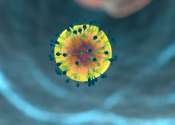Last update:
Immunology news
Immunology
Gut bacteria engineered to act as tumor GPS for immunotherapies
Immunotherapeutic approaches have substantially improved the treatment of patients with advanced malignancies. However, most advanced and metastatic malignancies remain incurable and therefore represent a major unmet need.
Oct 4, 2024
0
22
Oncology & Cancer
Study unveils the role of gamma-delta T cells in cancer immunology
A new study published in Cell Reports Medicine reveals critical insights into the role of gamma-delta T cells across 33 cancer types, shedding light on their potential as clinical biomarkers and therapeutic targets in cancer ...
Oct 4, 2024
0
23
Cilta-cel found highly effective in first real-world study of patients with relapsed or refractory multiple myeloma
In the first study to report real-world outcomes from ciltacabtagene autoleucel (cilta-cel), a chimeric antigen receptor (CAR)-T therapy for multiple myeloma, patients experienced efficacy and safety results similar to those ...
Oct 4, 2024
0
15

Research reveals gene expression's role in depression and immunity
A new study, conducted in a shared effort between U.K. and Italian researchers offers novel insights about the biological mechanisms behind major depressive disorder (MDD), and especially on the role of the immune system.
Oct 4, 2024
0
1

Experimental blood test improves early detection of pancreatic cancer
An experimental blood test detects early-stage pancreatic cancer more effectively than other available tests, reports a new study published in Cancer Letters. The findings pave the way for further evaluation of the test in ...
Oct 4, 2024
0
0

Biomarker can help health care assess severity of COVID-19
Researchers at Karolinska Institutet and the University of Gothenburg have identified a biomarker that could become an important tool for health care in assessing patients with acute COVID-19 infection. The researchers have ...
Oct 4, 2024
0
0

Understanding liver fibrosis: Insights from Alagille syndrome
What influences the extent of scar tissue, or fibrosis, that develops in the liver when people suffer from liver disease? While a small amount of fibrosis is a normal part of the healing process, excessive fibrosis can occur, ...
Oct 4, 2024
0
0

Here's why B cells benefit from booster shots
Certain infectious diseases, such as COVID or the flu, evolve constantly, shapeshifting just enough to outmaneuver our immune systems and reinfect us repeatedly. But subsequent reinfections often don't lead to the most severe ...
Oct 3, 2024
0
18

Scientists discover new mechanism controlling T-cells in inflammation
Northwestern Medicine scientists have discovered a new mechanism that controls a specialized group of T-cells, known as regulatory T-cells, and may serve as potential therapeutic targets to treat inflammatory disorders and ...
Oct 3, 2024
0
22

Viruses found hiding in lungs' immune cells long after initial illness
Doctors have long known that children who become seriously ill with certain respiratory viruses such as respiratory syncytial virus (RSV) are at elevated risk of developing asthma later in life. What they haven't known is ...
Oct 2, 2024
0
57

Curbing blood cancers by teaching immune cells to kill mutant stem cells
Blood stem cells, which give rise to all of our blood cell types, undergo a quality assurance process after they're born. As the lab of Leonard Zon, MD, director of the Stem Cell Research program at Boston Children's, has ...
Oct 2, 2024
0
21

Scientists uncover genetic cause of rare autoimmune disorder
A team of international scientists has uncovered the genetic underpinnings of a rare, inherited autoimmune disorder, according to a study recently published in Science Translational Medicine.
Oct 2, 2024
0
59

New cardiovascular disease risk marker discovered in older women
Researchers at Karolinska Institutet have identified a new potential risk marker for cardiovascular disease in women. A new study shows an association between low levels of an anti-inflammatory antibody and the risk of heart ...
Oct 2, 2024
0
69

Combining cell therapy with approved drug shows promise for treating multiple sclerosis
Multiple sclerosis (MS) is a long-term disease where the immune system mistakenly attacks the protective layer around nerve cells, known as the myelin sheath. This leads to nerve damage and worsening disability. Current treatments, ...
Oct 2, 2024
0
11

Researchers propose a new treatment for brain metastasis based on immunotherapy
Researchers at the Spanish National Cancer Research Center (CNIO) propose a new treatment for brain metastases that respond poorly, or not at all, to immunotherapy, and provide a biomarker to predict in which cases it should ...
Oct 2, 2024
0
27

Unveiling genetic insights: How PAI-1 polymorphisms influence COVID-19 outcomes
Despite global vaccination efforts, COVID-19 continues to pose significant risks, leading to severe complications and fatalities. These risks are driven by disrupted coagulation, impaired fibrinolysis, which is the process ...
Oct 2, 2024
0
1

How to get hay fever relief from fall allergies
Autumn is the season of change, with green leaves turning color and temperatures cooling. It's also the season of hay fever, or allergic rhinitis.
Oct 2, 2024
0
0

Researchers build first large-scale atlas of how immune cells react to mutations during cancer immunotherapy
A Cleveland Clinic-led research collaboration between Timothy Chan, MD, Ph.D., Chair of Cleveland Clinic's Global Center for Immunotherapy, and Bristol Myers Squibb has published the most comprehensive overview to date of ...
Oct 1, 2024
0
9

Cellular power-up: Stem cells provide T cells a lifeline as cancer champions
In a pioneering study that bridges the gap between science fiction and reality, researchers have unveiled an innovative method to enhance T and CAR-T cells—our body's natural and engineered defenders against cancer—by ...
Oct 1, 2024
0
40

New mouse models offer valuable window into COVID-19 infection
Scientists at La Jolla Institute for Immunology (LJI) have developed six lines of humanized mice that can serve as valuable models for studying human cases of COVID-19.
Oct 1, 2024
0
31

Promising tuberculosis therapy safe for patients with HIV, finds study
A therapy showing promise to help control tuberculosis (TB) does not interfere with combined antiretroviral therapy (cART), according to research by Texas Biomedical Research Institute (Texas Biomed).
Oct 1, 2024
0
0

Immunotherapy for gum disease? Study in mice shows promise
Targeting the immune system could prevent or treat periodontal disease (PD), a common but serious disease of the gums, according to new research from the University of Pittsburgh.
Sep 30, 2024
0
51

Researchers discover mechanism driving immune perturbations after severe infections
Researchers at Baylor College of Medicine and collaborating institutions have discovered a mechanism that drives the long-term decline in immune response that is observed after tuberculosis (TB) has been successfully treated. ...
Sep 30, 2024
0
38

COVID-induced immune memory could protect against severe cases of flu, mouse study suggests
More than 200 viruses can infect and cause disease in humans; most of us will be infected by several over the course of a lifetime. Does an encounter with one virus influence how your immune system responds to a different ...
Sep 30, 2024
0
12

Improving next-generation cancer treatments with cryoimmunotherapy
Northwestern Medicine scientists have developed a more effective method of delivering a cutting-edge cancer treatment, according to findings published in the journal ACS Nano.
Sep 30, 2024
0
31













































